#Queen Nzinga of Ndongo and Matamba
Text
Time Travel Question 50: Early Modernish and Earlier 4
These Questions are the result of suggestions a the previous iteration.This category may include suggestions made too late to fall into the correct earlier time grouping. In some cases a culture lasted a really long time and I grouped them by whether it was likely the later or earlier grouping made the most sense with the information I had. (Invention ofs tend to fall in an earlier grouping if it's still open. Ones that imply height of or just before something tend to get grouped later, but not always. Sometimes I'll split two different things from the same culture into different polls because they involve separate research goals or the like).
Please add new suggestions below if you have them for future consideration. All cultures and time periods welcome.
#Time Travel#Early Modern#Queen Nzinga#Ndongo#Matamba#Queen Nzinga of Ndongo and Matamba#African History#Women's History#Women in History#Edward IV#English History#Medieval History#Middle Ages#Susquehannocks#Indigenous history#North American Indigenous History#North American History#Iroquois#Five Nations#South American History#Aotearoa#New Zealand#Mayans#Knitting#Mansa Musa#Indigenous History#The Americas#1400#History of Food#South American History
246 notes
·
View notes
Text
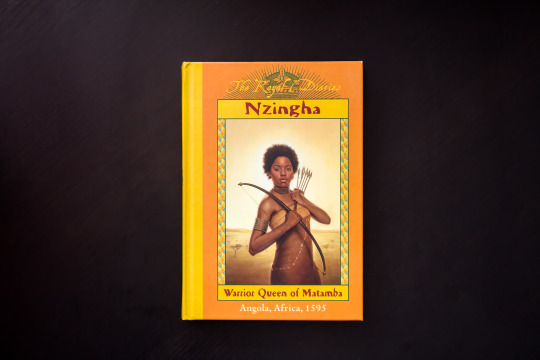
Nzingha: Warrior Queen of Matamba, Angola, Africa, 1595 by Patricia McKissack (2000)
0 notes
Text
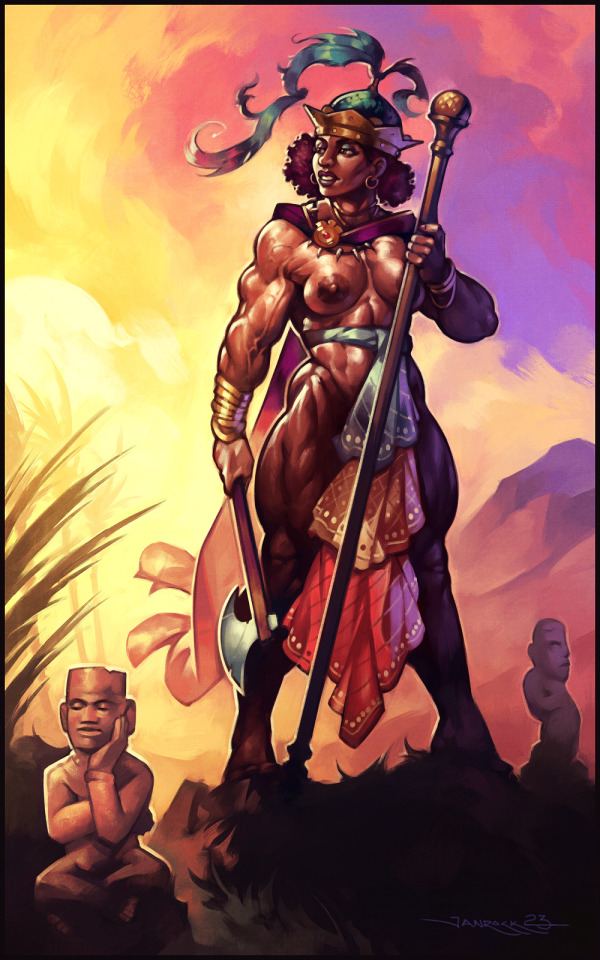
Ana Nzinga Mbande (1583 - 1663), queen of Ndongo, conqueror of Matamba.
205 notes
·
View notes
Note
What are your fav random (could be significant or insignificant) premodern historical facts, one for each continent?
Well, I don't know for sure about my FAVORITE favorites, but these are some people/events that I find interesting. We'll skip Europe just because I'm always for more focus on the global premodern world, and for studying ancient and medieval Africa, Asia, America, Oceania, etc. more closely. Too many people still think that "the medieval world' was only confined to Europe, which is.... yeah, not true. Also, I picked two facts for each region, just because.
The Americas
The huge settlement of Cahokia, which sits just outside modern-day St. Louis, is just one of many flourishing pre-Columbian metropolises where Native Americans lived in large, advanced cities. Native culture and civilization in the Americas is also much, much older than you probably think.
A fifteenth-century Aztec king, Nezahualcóyotl, wrote one of my favorite lines of existential philosophy ever, mulling on the question of whether humans had souls and if there was life after death: Do flowers go down to the realm of the dead? The simplicity and poignancy is hard to forget, especially since it comes from a member of a world and a culture scoured totally out of existence by the conquering, colonizing Spaniards.
The Middle East and Central Asia
One of the oldest named individuals in history is the 23rd-century-BC Sumerian priestess, princess, and poet Enheduanna. Obviously she is much older than even antiquity, but I still think it's cool that we have a record of a woman that far in the past.
Ibn Sina/Avicenna, the 9th/10th century Islamic polymath, lived in Bukhara and Samarkand, in modern-day Uzbekistan. My favorite anecdote about him, aside from the fact that he is believed to have written almost 500 books (only half of which, alas, survive), is that one day, he bought a copy of Aristotle's Metaphysics and read it forty times in a row, after which he still didn't understand it. He was deeply disgruntled, until he found an annotated commentary edition that explained it (he was very happy about this). So next time you read a classic and don't get it, please know that one of the smartest men who has ever lived also used the SparkNotes.
Eastern Asia
One of the world's very first novels, at least we know of, was written by a 11th-century Japanese imperial handmaiden, Lady Murasaki Shikibu. It's called The Tale of Genji, and you can get a free English translation if you want to read it. The internet, man!
The 14th/15th century Chinese admiral and adventurer Zheng He made seven legendary treasure-hunting voyages across the world, rather like the fictional Sinbad. He was also originally born to a Muslim family, since Islam has had a long presence in China.
Africa
The 14th-century king of the Empire of Mali, Mansa Musa, was probably the richest man who ever lived. He spent so much gold on his 1324 hajj to Mecca that he inadvertently crashed the Egyptian economy. He was also a patron of the intellectual capital and center of learning in the city of Timbuktu, which held one of the finest collections of manuscripts and scholars in Africa.
The 16th/17th century Angolan queen Nzinga of Ndongo and Matamba is likewise a total badass who ruled for almost 40 years, fought Portuguese colonizers (and won), and is likewise someone that more people should know about.
Oceania
The aboriginal culture of Australia is SO FUCKING OLD, and its history is preserved largely through the exact memorization and recital of detailed oral traditions for thousands of years, that we actually have accurate eyewitness accounts of the end of the Ice Age, meteor strikes, the rise of ancient sea levels, and more. If you don't think that is unbelievably mind-blowing amazing, I have no idea what to tell you.
Likewise, incredibly sophisticated Polynesian navigation enabled the construction of flourishing ancient Pacific societies connected across oftentimes thousands of miles of open ocean, passed down in part by oral tradition and part by techniques such as stellar navigation, study of wave patterns, bird migrations, and other cues from the natural world. They traveled everywhere in their double-hulled canoes, including possibly as far as Antarctica and to their indigenous brethren in the Americas.
245 notes
·
View notes
Text
Historical Queens of Africa in Movies
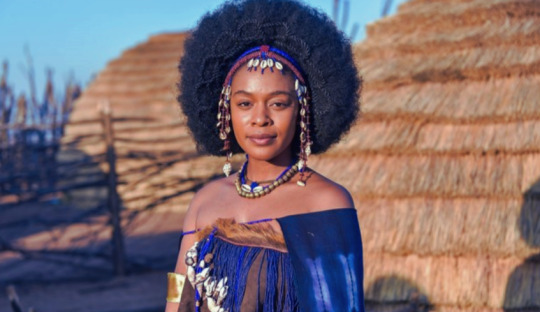


Queen Nandi (Mother of Shaka), (Shaka Ilembe, 2023))
Queen Nzinga of Ndongo and Matamba, (Njinga: Queen Of Angola, 2013)
Queen Amina of Zazzau, (Amina (Netflix), 2021)
#black royalty#black women#black queens#african royalty#queen nandi#amina of zazzau#Njinga#Nzinga#netflix#shaka zulu#shaka ilembe#hopefully there will be more adaptions in the future
15 notes
·
View notes
Text
NZINGA // QUEEN OF THE AMBUNDU KINGDOMS
“She was a West African ruler who served as queen of the Ambundu Kingdoms of Ndongo and Matamba, located in present day northern Angola. She received military and political training as a child and demonstrated an aptitude for defusing political crises as an ambassador to the Portuguese Empire. She later assumed power over Ndongo after the deaths of her father and brother and would go onto conquer Matamba. She ruled during a period of rapid growth in the African slave trade and enroachment of the Portuguese Empire into South West Africa, in attempts to control the slave trade. She fought for independence and stature of her kingdoms in a reign that lasted 37 years.”


4 notes
·
View notes
Text
HORSES NEIGHED AND FIRES CRACKLED as Queen Tamar of Georgia walked among her troops on the eve of battle in July 1203. Her enemies outnumbered her soldiers nearly two to one. Still, the queen did not waver as she spoke words of courage to the assembled army. In a show of humility, she stood before them barefoot while wearing lavish garments full of religious symbolism to inspire a righteous bravery in all who saw her. As she finished her rousing speech, hardy, battle-worn soldiers stood, raised their spears, and shouted, “To our king!” The next day, the Georgian army decimated their foe.
In the late 12th and early 13th centuries, Tamar the Great ushered in Georgia’s golden age. She expanded borders, oversaw massive architectural projects, and helped define the kingdom’s unique identity at the crossroads of East and West. She sat on war councils and, as one chronicler wrote, “took counsel with them, not like a helpless person, or a woman, and did not neglect the dictates of reason.”
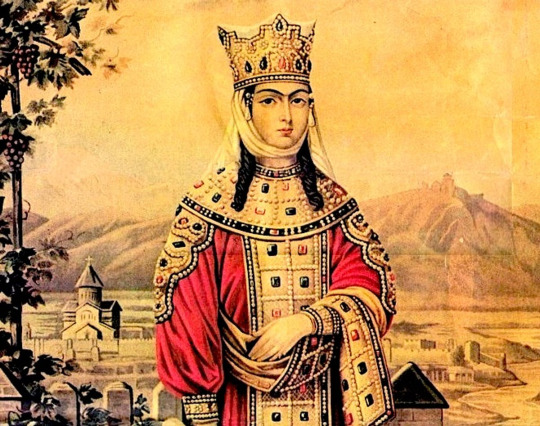
As father/daughter historians Jonathan and Emily Jordan demonstrate in their book, War Queens: Extraordinary Women Who Ruled the Battlefield, Tamar was far from history’s only warrior queen. The pair recently launched a new podcast with Diversion Audio (also called War Queens) where they dig into all the twists and bloody turns of Tamar’s story alongside other battle-hardened queens.
Atlas Obscura sat down with Emily Jordan to talk about why Italian philosopher Niccolò Machiavelli had it out for her favorite fortress-seizing countess, an African queen who went toe-to-toe with Portuguese enslavers, and why so often these women’s stories go overlooked.
. . .
Who is your favorite person you highlight in the book or on the podcast? And why?
I think in terms of courage, I’d have to say Caterina Sforza. She’s really just an incredible Renaissance woman. She learned all about medicine, botany. She got to interact with Botticelli and Da Vinci. She went to people during times of plague with medicines that she created and studied. My favorite story about her is when her husband’s political interests were compromised when the pope died. Her husband was a paranoid, vicious man, but his family member was the pope. And when the pope passed away, that got Caterina thinking, “We may not be confirmed as the ruler of this city, of Imola.”
So she rides down to Rome, while pregnant, in her early twenties, and she takes hold of this great fortress, Castel Sant’Angelo. The cardinals have to cross in front of the castle on this big bridge to get over to Vatican City. So she points the cannons right at them and says. “Rome, hold up. Stop. I’m in charge.” She stops all of Rome and stops the cardinals from electing a new pope until they confirm her and her husband’s titles. The fact that she did this in her early twenties while pregnant is insane to me.
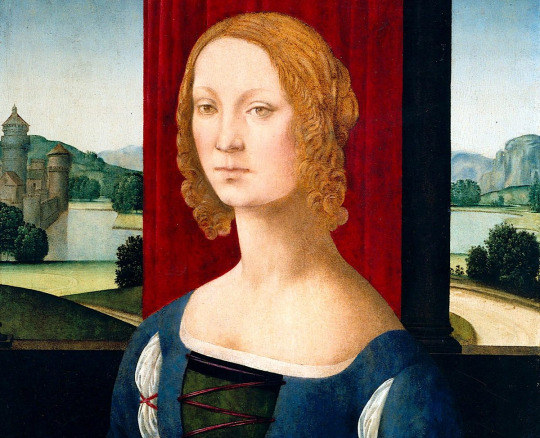
Did any of these war queens have experience in battle?
Queen Njinga Mbandi of Ndongo-Matamba [two African kingdoms located in present-day Angola] is by far the most physically capable of all the women we write about. Very few of our women really had a lot of hand-to-hand combat experience; Caterina Sforza had a little bit. But Njinga [sometimes spelled “Nzinga”] would charge into battle with her people. She lived during the 17th century and was the leader of her tribe. She had an older brother who was in power before her, but she was a better hand-to-hand combat fighter, leader, and diplomat, so she kind of takes charge. She was this amazing chameleon and takes on different types of cultures in order to unite her people.
She was trained to do this martial art. It’s linked to the Brazilian art of capoeira where you almost do dances as exercises, jumping side to side out of the way of arrows and bullets. Certain scholars even claim that a part of the art, called ginga [pronounced and sometimes spelled “jinga”], is named after her. Their main weapon was a form of battle axe, and she was really well-trained with that axe as well.
5 notes
·
View notes
Text
Let us redouble our efforts to confront the legacy of slavery in our own communities and societies.
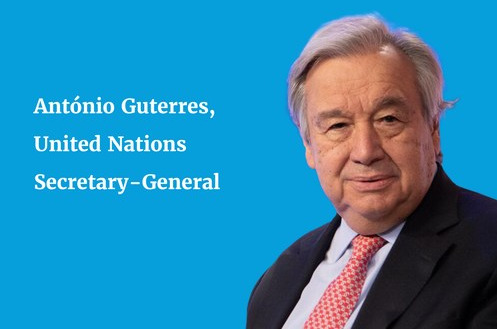
Excellencies, dear colleagues, friends,
I am honoured to be with you to commemorate the International Day of Remembrance of the Victims of Slavery and the Transatlantic Slave Trade.
Please allow me to read a message from the Secretary-General, marking this important annual commemoration:
“For four hundred years, enslaved Africans fought for their freedom, while colonial powers and others committed horrific crimes against them.
On the International Day of Remembrance of the Victims of Slavery and the Transatlantic Slave Trade, we remember and honour the millions of Africans who were trafficked and enslaved.
Their lives were ruled by terror, as they endured rape, floggings, lynchings and other atrocities and humiliations.
Many of those who organized and ran the Transatlantic slave trade amassed huge fortunes. Meanwhile, the enslaved were deprived of education, healthcare, opportunity, and prosperity.
This laid the foundations for a violent discrimination system based on white supremacy that still echoes today.
Descendants of enslaved Africans and people of African descent are still fighting for equal rights and freedoms around the world.
Today and every day, we reject the legacy of this horrific crime against humanity.
We call for reparatory justice frameworks, to help overcome generations of exclusion and discrimination.
We appeal for the space and necessary conditions for healing, repair and justice.
And above all, we resolve to work for a world free from racism, discrimination, bigotry and hate.
Together, as we remember the victims of the Transatlantic Slave Trade, let’s unite for human rights, dignity and opportunity for all.”
Excellencies, colleagues, friends,
On this important day of remembrance, we also recall the courage of generations of enslaved Africans and their descendants who stood against oppression and subjugation.
From the time of the first abductions, to the door of no return in Africa, to the cities and farms where they were forced to work, enslaved Africans resisted their captors, revolted against their masters, and worked to escape their bonds.
The resolute resistance of Queen Nanny of the Maroons in my own country, Jamaica, forced the British Empire to the peace table.
In Brazil, the leadership and struggle of Zumbi dos Palmares is celebrated annually as a Day of Black Consciousness.
The skillful diplomacy and military prowess of Queen Nzinga Mbandi of Ndongo and Matamba in present-day Angola, thwarted Portugal’s colonial ambitions.
In Saint Domingue, in present-day Haiti, Toussaint Louverture’s heroism transformed a slave rebellion into a revolutionary movement.
Here in the United States, Harriet Tubman made a death-defying run for freedom and helped others to win their liberation on the Underground Railroad.
And, on a slave ship on the way to the American state of Georgia, a group of Ibo people from what is now Nigeria rose in rebellion and drowned their captors, before tragically committing mass suicide, refusing to give up their dignity and freedom.
This evening, I will attend the opening of a new UN exhibition which tells the story of this tragic event.
Excellencies, friends,
The heroic struggles of these and many other leaders inspired generations of activists.
But they are not over.
Descendants of enslaved Africans and people of African descent around the world are still fighting for their rights and for their freedoms.
The original lie of white supremacy, which animated and justified the horrors of the Transatlantic Slave Trade, the Jim Crow laws and the Apartheid system, continues to poison communities and societies.
Today, as we recall centuries of injustice, it is our duty to reject and dismantle racist oppression, end the spread of hatred and lies online, and confront slavery’s lasting legacy of marginalization and impoverishment.
We must reverse the consequences of generations of exclusion and discrimination that led to gross inequities in healthcare, education, and social and economic opportunities — inequities as you know that continue to this day.
In the many countries affected by the Transatlantic Slave Trade, everyone, and all parts of society, have a part to play in this work of healing and repair.
From acknowledging and seeking forgiveness for the egregious crimes of the past… to creating mechanisms for redress… and rejecting hatred and discrimination in all its forms – all can help to heal the intergenerational trauma and repair fractured and segregated societies.
Today, as we remember the victims of slavery and the Transatlantic Slave Trade, let us redouble our efforts to confront the legacy of slavery in our own communities and societies.
Together, let us resolve to learn the lessons of history and build a more just, a more equal, and a more prosperous world for all.
Thank you.
Secretary-General's remarks to the General Assembly on the International Day of Remembrance of the Victims of Slavery and the Transatlantic Slave Trade 2024.
#slaveryremembranceday#victims of slavery#slavery remembrance day#transatlantic slave trade#25march#united nations headquarters#united nations secretary general#statements#we remember#legacy of slavery
0 notes
Text
Nzinga Mbande: Warrior Queen of Angola
Nzinga Ana de Sousa Mbande (c. 1583 – 17 December 1663) was a southwest African ruler who ruled as queen of the Ambundu Kingdoms of Ndongo (1624–1663) and Matamba (1631–1663), located in present-day northern Angola. Born into the ruling family of Ndongo, her father Ngola Kilombo Kia Kasenda was the king of Ndongo. She is remembered in Angola as the Mother of Angola, the fighter of negotiations,…

View On WordPress
#African History#African Leaders#Ambundu Kingdoms of Ndongo#Angola History#central africa history#Nzinga Ana de Sousa Mbande
0 notes
Text
Queen Nzinga of Ndongo and Matamba #nzinga #mbubndu #angola #
youtube
0 notes
Text
African Queens Ground-Breaking Netflix Series Narrated By Jada Pinkett Smith

Netflix began streaming a powerful and spell-binding series narrated by Jada Pinkett Smith, African Queens on February 15, and it is a jewel.
What is African Queens?
African Queens is a rare and in-depth look at Africa’s often overlooked royals. It is a recreation of a retelling of the narrative of the most powerful, bold, fearless, and beautiful women who ruled in the great continent of Africa. It is told through the voices of scholars and historians, and its dramatized for greater effectiveness. While the lens is trained on the narrative of the queen, it examines the whole of her surroundings. African Queens examines the culture, political structure, customs, and practices of those who are her people. It is a selection that exquisitely showcases so much of Africa, the regality of the leaders, the innovativeness, societal structure, and the raw and natural gloriousness of the land they inhabit. However, it does so without sacrificing some of the uglier truths. Instead, it gives a robust perspective offering context while educating its viewers.
The Project
Jada Pinkett Smith not only narrates the moving docu-series, but she also serves as Executive Producer. However, it is told from an African perspective. According to iAfrica, African Queens is written by Kenyan-born storyteller Peres Owino and British diplomat NneNne Iwuji. This project comes via Smith’s Westbrook Studios and independent film studio Nutopia. However, for Smith, this series is a passion project, a means to educate and empower. According to iAfrica, “Pinkett, who was a key force behind the project, has cited the imperative nature of reviving these stories of African female leadership to empower today’s young, black women.” While it does much to empower female viewership, it is an offering that inspires the whole community.
Queen Njinga (Nzinga)
The segment now streaming focuses on Queen Njinga of Ndongo. And it retells her story so that the world will not only know her name but remember her legacy and impact. As iAfrica cites, “Queen Nzinga of Ndongo and Matamba came to a position of power during the 17th century, when she ruled over Angola and fought off Portuguese settlers., a feat worthy of the annals of history.
Hip-Hop and the Promotion
Hip-hop is a culture, a movement, a complex structure held up by multiple pillars. There are four basic tenants or pillars, or in some circles, classed as elements that some hip-hop scholars define as language. And those languages are breakdance, rap, deejaying, and graffiti. While these are the primary pillars, they are not the only pillars. According to an article by Midnation, there are rather nine pillars. One of those remaining five pillars includes knowledge. Midnation notes, “In the book The Fifth Element of Hip Hop Knowledge, Travis L. Gosa affirms that knowledge is the fifth fundamental pillar of this culture. Without it, the other elements would not be cohesive."
So as a celebration of hip-hop and black history, FM Hip Hop aims to uphold the pillars of spreading and sharing a wealth of information that informs the populace and promotes, uplifts, and advances the culture.
In Conclusion
For those interested in a cultural exploration of kingdoms and rulers of the great African continent and the empires that stretched across that land, tune in to African Queens.
https://youtu.be/5z6TntNvGZI
Read the full article
0 notes
Photo

Queen Nzinga (1583- December 17, 1663) was a 17th-century queen of the Ndongo and Matamba Kingdoms of the Mbundu people in what is known as Angola today. Born into the ruling family of Ndongo, she demonstrated an aptitude for defusing political crises in her capacity as ambassador to the Portuguese and later assumed power over the kingdoms after the death of her brother. She ruled during a period of rapid growth in the African slave trade. Her reign lasted 37 years. She fought for the freedom and stature of her kingdoms against the Portuguese, who were concentrating their efforts towards Southwest Africa, in attempts to control the slave trade. She is remembered in Angola for her intelligence, her political and diplomatic wisdom, as well as her brilliant military tactics. A major street in Luanda is named after her, and in 2002 a statue of her in Largo do Kinaxixi, Luanda, Angola was dedicated by then-President Santos to celebrate the 27th anniversary of independence. "She was a fierce anti-colonial warrior, a militant fighter, a woman holding power in a male-dominated society, and she laid the basis for successful Angolan resistance to Portuguese colonialism into the twentieth century." #africanhistory365 #africanexcellence https://www.instagram.com/p/CmRFBOzuCTW/?igshid=NGJjMDIxMWI=
0 notes
Text
Civilization VI expands now with new content
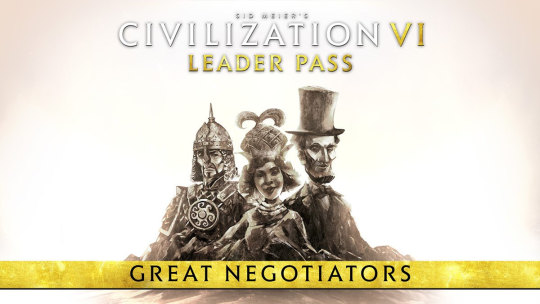
Leader Pass launches now for Civilization VI expanding the game on Linux, Mac, and Windows PC. All thanks to the work of developers Firaxis Games and Aspyr. Which is available now on Steam.
Following last week's announcement of Civilization VI: Leader Pass. This is also a new season pass that adds 18 playable leader selections to Civilization VI. The first DLC pack, Great Negotiators, is now live. Along with some negative reviews. Since the Anthology edition does not show the Leader Pass DLC content. And potentially borks the game. Although I have not personally tested it on Linux yet. Still, feel the need to share details.
Test your diplomacy skills with the Great Negotiators Pack. This includes Abraham Lincoln (United States) and Queen Nzinga Mbande (Kongo). As well as the Sultan Saladin (Arabia). Here are some specific details about the Leaders themselves:
Leader Trailer: Abraham Lincoln (United States)
youtube
Lincoln hurled the United States into the industrial age. While ruling over the Union victory in the American Civil War. His new Leader Pass abilities speak to these successes. As does his Preserver of the Union agenda. Which results in him only liking Civilizations with the same form of Government.
New Ability: Emancipation Proclamation
(Base game) Industrial Zones and their buildings give +2 Amenities. While your Plantations give -1 Amenities.
(Rise and Fall & Gathering Storm DLCs) Industrial Zones give +3 Loyalty per turn. But your Plantations give -2 Loyalty.
(Base game) Receive a free Melee unit after building Industrial Zones and their structures. The free unit does not need resources when created or maintain. Also receiving +5 Combat Strength.
(Rise and Fall & Gathering Storm DLCs) Receive a free Melee unit and an Amenity. Doing so after building Industrial Zones and their buildings. The free unit does not require resources when created or to maintain. But receives +5 Combat Strength.
Leader Trailer: Nzinga Mbande | Civilization VI: Leader Pass
youtube
Given her history of dealing with the Portuguese, Mbande Nzinga has a Decolonization agenda. As a result, she likes Civilizations who stick to one continent. But also dislikes Civilizations with cities on multiple continents.
New Ability: Queen of Matamba and Ndongo
+5 Combat Strength against Civilization's whose capital is on a different continent.
Trade Routes to receive +20% Yields in Leader Pass. Due to Civilizations whose home continents are the same as yours. But -15% to Trade Routes to other Civilizations.
Trailer: Sultan Saladin | Civilization VI
youtube
The existing Civilization VI leader Vizier Saladin can build religious buildings. Doing so for a fraction of the usual Faith cost. Dislikes leaders who follow other Religions. Sultan Saladin, on the other hand, receives bonuses for all of his Combat and Religious units. While dislikes leaders who wage war on followers of his Religion.
New Ability: The Victorious Military
+100% Flanking and Support Bonus to all Combat and Religious units.
Civilization VI: Leader Pass content is coming via six DLC. Launching now through March 2023. Along with support for Linux, Mac, and Windows PC via Steam. Priced at $19.99 USD / £17.99 / 19,99€. Launching the first DLC, Great Negotiators Pack now. The Leader Pass content will also be auto delivered as it is released.
The one big advantage is Sid Meier’s Civilization VI Anthology. Which is discounted 86% on Steam. Priced at $29.77 USD / £25.83 / 29,77€. Which is a huge savings. Humble Store fans can also save big with a 70% discount. Priced at $29.99 USD / £25.49 / 29.99€. Again, with builds for Linux, Mac, and Windows PC. Yet Steam Deck Playable.
#civilization vi#leader pass#anthology#linux#gaming news#firaxis games#aspyr media#ubuntu#mac#windows#pc
0 notes
Text

Close-up view of a statue of Queen Nzinga in Luanda, Angola.
7 notes
·
View notes
Text

Queen Nzinga- An African queen and warrior who defended her people from slave traders for thirty years until her death.
1583-1663
#African#Queen Nzinga#blm#african queen#African art collection#sketch#pls don’t repost#drawing#art#blacklivesmatter#my art#Ana de Sousa Nzingha Mbande#Queen Nzingha#Ndongo#Matamba#african history#slavery
7 notes
·
View notes
Photo

Njinga of Ndongo and Matamba - The queen who held the Portuguese at bay
Njinga (1582-1663) was a warrior queen who ruled over the kingdoms of Ndongo and Matamba (in modern-day Angola). She fought against the Portuguese and managed to preserve her people’s independence.
Njinga was the daughter of the king of Ndongo. When she was born, her country was already at war with the Portuguese who had established a coastal trading colony in 1575. The relations between the two countries were friendly at first, but ultimately degenerated into armed conflict due to the Portuguese ambitions of gaining economic and military control of the region.
Though Njinga would become the first woman to rule over her people, women nonetheless played an important role at court. As a child, Njinga sat at her father’s council and displayed physical and intellectual prowess. She was particularly skilled with weapons, especially the battle axe that was the royal symbol of Ndongo. Her ability with the battle axe and performing military dances remained impressive even when she was in her seventies. She was already a military leader in her own right before accessing to the throne.
Her bother Ngola Mbande took power in 1617. Since Njinga’s only son was a potential rival, he had him killed. He then ordered to have Njinga and her sisters sterilized. Ngola fought against the Portuguese without success. When a new governor arrived in 1621, he sent his sister Njinga to negotiate with him.
When Njinga entered the Portuguese governor’s tent, there was no chair for her. Njinga wanted to deal with him as an equal and thus refused to sit on the floor. She ordered a female slave to kneel on her hands and knees and sat on her back during the whole process. Njinga then successfully negotiated a peace treaty on her brother’s behalf.
Ngola Mbande died in 1624. The Portuguese said that Njinga had poisoned him while Angolan oral history states that he committed suicide in a moment of despair. Njinga then poisoned Ngola’s son and became Ndongo’s first female ruler. She then took a number of symbolic measures to strengthen her authority. She married a man and asked him to dress as a woman. She referred to him as a female and he had to call her “king” instead of “queen”. She also took several male concubines and ordered them to dress like women.
Njinga spent the next thirty years warring against the Portuguese. At some point, she had to relocate her court to a new state, Matamba, that she used as a base. To increase her military power, she welcomed runaway slaves and Portuguese-trained African soldiers. Njinga’s troops also included female units who were integrated to the general army. She also boasted a retinue of female bodyguards.
In 1641, Njinga found a new ally in the Dutch East India Company who attacked and conquered the Portuguese colonial city of Luanda. She sent ambassadors and the two made an alliance. A Dutch captain who served under her would describe her as a “cunning and prudent virago, so much addicted to arms that she hardly uses other exercises and so generously valiant that she never hurt a Portuguese after quarter was given and commanded all her servants and soldiers to do the same”.
In 1648, they had almost driven the Portuguese out of Angola, but reinforcement came and the Dutch were defeated. Njinga fled to Matamba, but continued to use guerrilla tactics to fight the Portuguese and their African allies. According to one Portuguese observer, she launched 29 attacks between 1648 and 1650 alone. She also focused on developing trade, capitalizing on Matamba’s position as a gateway to the Central African interior.
Njinga led her troops into battle for the last time in 1657. At that time, she was nearly seventy-five. Before the battle, she prepared herself by leading her soldiers, many of them young enough to be her grandchildren, through rigorous military exercises with spears and arrows.
When she died in 1663, Njinga left a prosper kingdom, able to survive as an independent state. The Portuguese only succeeded in conquering it in 1909, making it part of their colony of Angola.

References:
Castenell Louis A., Pinar William F., Understanding Curriculum as Racial Text: Representations of Identity and Difference in Education
Heywood Linda M., Njinga of Angola
Toler Pamela D., Women warriors, an unexpected history
“Women Leaders in African History: Ana Nzinga, Queen of Ndongo”
#njinga#queen njinga#Nzinga#ndongo#matamba#african history#warrior queens#black women in history#africa#angola#angolan history#17th century#warrior women#women in war#war#military history#female soldiers#women's history#history#women in history#Portugal#Portuguese history
145 notes
·
View notes